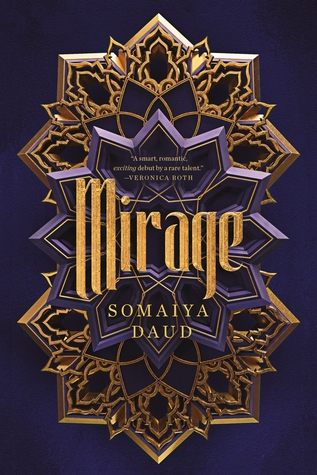The Sirens Review Squad is made up of Sirens volunteers, who submit short reviews of books (often fantasy literature by women authors) they’ve read and enjoyed. If you’re interested in sending us a review to run on the blog, please email us! Today, we welcome a review from Casey Blair on Somaiya Daud’s Mirage.

I love stories about bold girls who forge their own paths and throw off conventions. I love stories full of action, with space battles and magic duels and sword fights. I love stories about talented, skilled women, shining at what they do best.
Somaiya Daud’s debut novel Mirage isn’t one of them.
There is so much to love in Mirage. (The lone exception, ironically, being the romance, which for me was the least interesting part.) I love its rich setting, a fantasy Morocco-inspired culture in a world with intergalactic travel. I love how deeply that culture suffuses every part of the story: the prose woven through with poetry, the complicated female friendships and family relationships, the structural use of mimicry to examine appropriation, the allusions to female historical figures as symbols of inspiration—not just the warrior queen, but also the prophetess whose power endures in words—and the incisive critique of the long-reaching effects of colonialism across multiple axes.
But here’s what’s truly remarkable about what Daud has accomplished with Mirage and why I will be yelling at everyone (I do mean literally everyone) to read this book forever:
This is a story that poses the question, who are you when your oppressors can erase your face, your family, your history, your language, your culture? What can you do that matters?
And Mirage’s emphatic answer is that you do not have to be a uniquely talented bold girl who bucks tradition in order to deserve to be at the center of stories.
Early on, our protagonist Amani tells her captor that aside from speaking both the language of the oppressors and the language of the oppressed, she has no other skills. As far as her captors are concerned, this is absolutely true, though they don’t understand why that should give them pause. They don’t understand why they should fear a girl who can bridge understanding between people from different worlds. A girl who can make her culture and her people real and seen and valued to those who participate in its erasure, and who can understand her oppressors well enough to change their course. Her greatest asset is not her hidden knowledge of poetry, or the incredible attention to detail she’s forced to develop to imitate the princess, or the sharp-tongued court cleverness she learns to deploy on her own behalf.
It’s her capacity for empathy.
For Amani, finding joy in objectively terrible circumstances is worthwhile in its own right, not something to be ashamed of; happiness is rebellion, too. Although Daud is careful not to excuse those responsible for victimizing others, Amani doesn’t limit that desire for happiness to just herself or her people. And while she is a dreamer, she’s not exempt from the realities of living under conquest, which makes her bravery in trying to make her dreams reality all the more powerful.
Amani chooses to embrace tradition when the world shaped by her oppressors belittles her into discarding it. She clings fast to caring about other people rather than closing herself off. She doesn’t take the expected path, be it revolution or assimilation. She considers what she can, in fact, do, given her many but unique constraints, and she resolves to do what she can.
I will tell anyone and everyone to read Somaiya Daud’s quiet, powerful story for its beautifully wrought characters, its resonant worldbuilding and prose, its centering of the representation of women (including mothers and old women, be still my beating heart—they can exist in fantasy worlds and matter) and people of color, and its profound rendering of colonization and its complexities. Any of those would be enough to make Mirage one of the best books I’ve read.
But more than that, what makes Amani special is her compassion coupled with action. Mirage is a story in which that alone is not only special enough—it’s more important than anything.
Casey Blair is an indie bookseller who writes speculative fiction novels for adults and teens, and her weekly serial fantasy novel Tea Princess Chronicles is available online for free. She is a graduate of Vassar College and of the Viable Paradise residential science fiction and fantasy writing workshop. After teaching English in rural Japan for two years, she relocated to the Seattle area. She is prone to spontaneous dancing, exploring ancient cities around the world, wandering and adventuring through forests, spoiling cats terribly, and drinking inordinate amounts of tea late into the night.







Connect with the Sirens community
Sign up for the Sirens newsletter